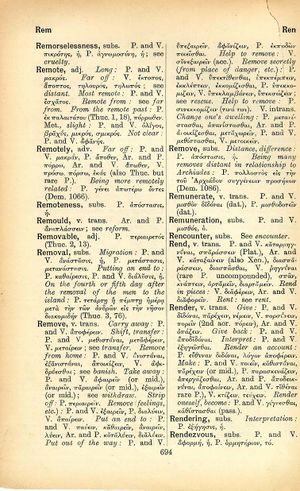remote: Difference between revisions
From LSJ
Νὺξ μὲν ἀναπαύει, ἡμέρα δ' ἔργον ποιεῖ → Nam nox quietem praebet, facit opus dies → Die Nacht lässt unsre Arbeit ruhn, der Tag sie tun
(CSV4) |
(6_14) |
||
| Line 8: | Line 8: | ||
Met., <b class="b2">slight</b>: P. and V. [[ὀλίγος]], [[βραχύς]], [[μικρός]], [[σμικρός]]. | Met., <b class="b2">slight</b>: P. and V. [[ὀλίγος]], [[βραχύς]], [[μικρός]], [[σμικρός]]. | ||
<b class="b2">Not clear</b>: P. and V. [[ἀφανής]]. | <b class="b2">Not clear</b>: P. and V. [[ἀφανής]]. | ||
}} | |||
{{Lewis | |||
|lshtext=<b>rĕmōtē</b>: adv., v. [[removeo]],<br /><b>I</b> P. a. fin. | |||
}} | }} | ||
Revision as of 08:21, 13 August 2017
English > Greek (Woodhouse)
adj.
Long: P. and V. μακρός. Far off: V. ἔκτοπος, ἄποπτος, τηλουρός, τηλωπός; see distant. Most remote: P. and V. ἔσχατος. Remote from: see far from. From the remote past: P. ἐκ παλαιτάτου (Thuc. 1, 18), πόρρωθεν. Met., slight: P. and V. ὀλίγος, βραχύς, μικρός, σμικρός. Not clear: P. and V. ἀφανής.
Latin > English (Lewis & Short)
rĕmōtē: adv., v. removeo,
I P. a. fin.

